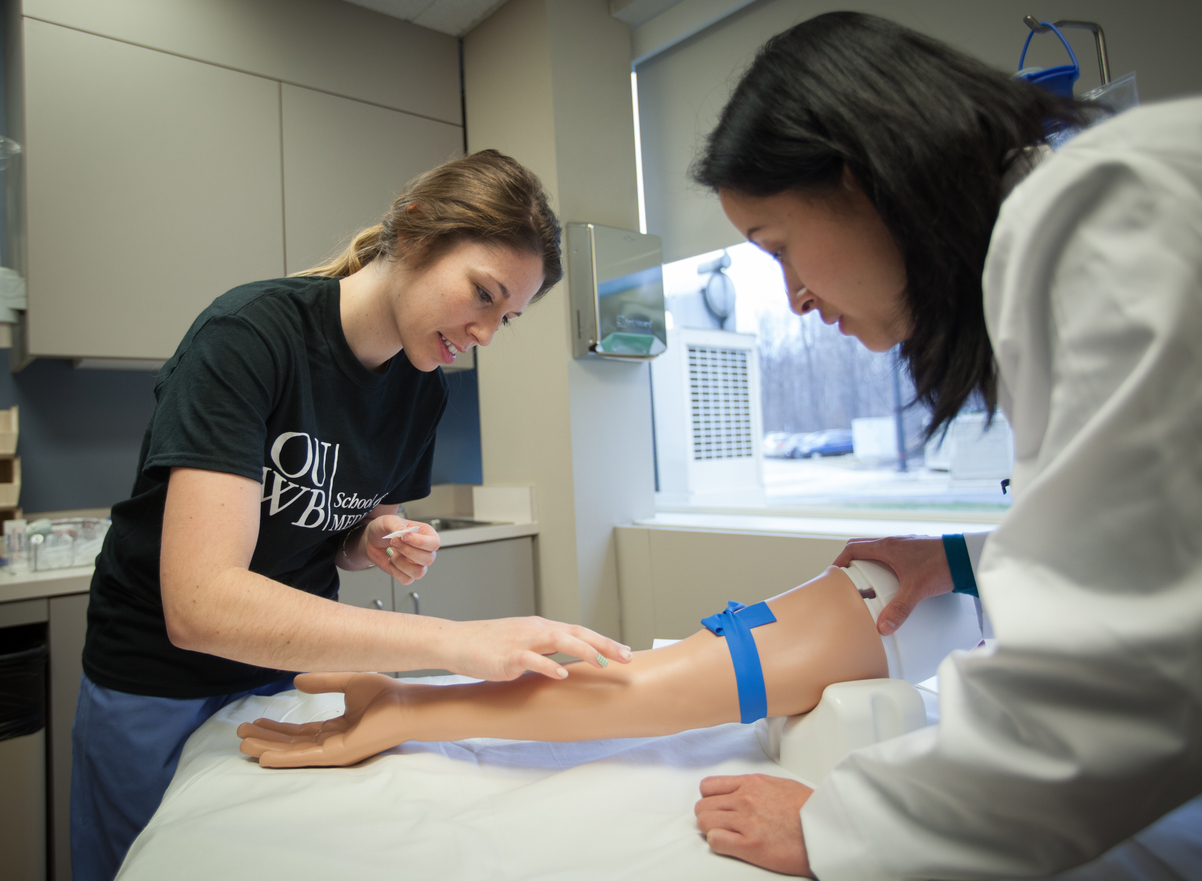
One of the aspects of OUWB that truly sets it apart is the Clinical Skills Training & Simulation Center — the school’s primary site for learners to practice and perfect patient skills in a realistic, state-of-the-art facility.
The Clinical Skills Training & Simulation Center is home to 16 simulated patient rooms, student and patient assembly areas, classrooms, and separate video control and observation suites.
It’s all in the name of providing students a hands-on training experience.
But what’s to be done when being hands-on isn’t a possibility?
Plenty, according to Maurice Kavanagh Ed.D., director of Clinical Skills Training and Simulation Center.
“The vast majority of the CSC offerings are designed around face-to-face, and even more challenging, hands-on experiences with patients,” he says. “We have had to reconfigure, and in most cases, redesign how we present the course materials and exams.”
Kavanagh took some time to answer a few questions on how the Clinical Skills Training & Simulation Center is staying on track given the challenges presented by the COVID-19 pandemic.
What are the challenges of working remotely?
The timeline of courses and clerkships remains largely unchanged, necessitating revisions occur with little to no lead time. This gives a whole new meaning to the "just in time" concept of production!
Related to the above, the ability to closely observe, interact with, and teach students the close personal aspects, including touch, of the doctor patient interaction are challenging to recreate. This is true for training the (standardized patients), too.
The easy access to casual, collegial exchanges, often the source of many an inspiration, are challenging to recreate, even with video links.
How are you adapting to this way of working?
It is challenging, and, even in the face of stay-at-home orders, kind of liberating. (I have not needed to tie a necktie in almost two months!)
We are collaborating with colleagues at other institutions to develop ways of presenting the curriculum with as much fidelity as reasonably possible. The AAMC and NBME have been providing guidance with this.
We stay in regular contact via phone and Google Hangouts.
Is there something you want to share with this audience about the new normal for the Clinical Skills Center?
The new normal for the CSC is a hodgepodge network of Google Hangouts, Panopto, WebEx, Learning Space, our cell phones, and... I expect as we return to the face-to-face environment of the CSC we will need to continue to develop remotely accessible resources for clinical skills. While the current circumstances are challenging for sure, they do open many doors, and present countless opportunities.
When we return to "regular face-to-face," whatever that may prove to be, our focus will be towards making the remote encounter a more mainstream part of our curriculum.
When you're not working, how are you coping with quarantine?
What's this "not working" thing you talk about? All of us are putting in more hours than before!
I'm quarantined with my fiancee and the boys (3 and 15) in Virginia, just south of D.C. She is currently assigned to the National Guard Bureau in Arlington, Virginia. With schools and daycare closed, we have our hands full working, doing school work and taking care of two active young fellows!
For more on the Clinical Skills Center, check out the video below!
For more information, contact Andrew Dietderich, marketing writer, OUWB, at [email protected].
Follow OUWB on Facebook, Twitter, and Instagram.
NOTICE: Except where otherwise noted, all articles are published under a Creative Commons Attribution 3.0 license. You are free to copy, distribute, adapt, transmit, or make commercial use of this work as long as you attribute Oakland University William Beaumont School of Medicine as the original creator and include a link to this article.

